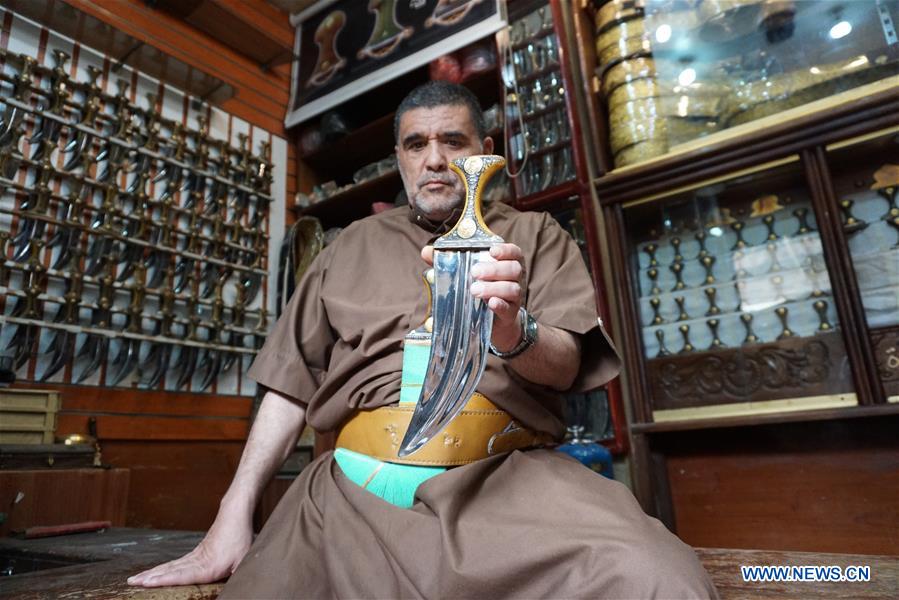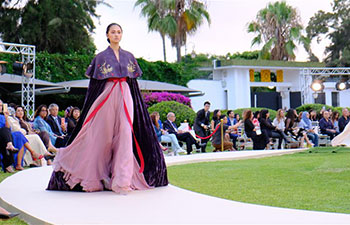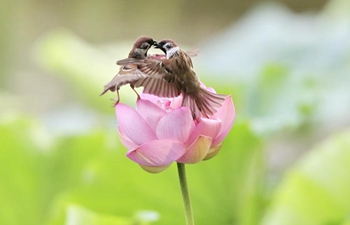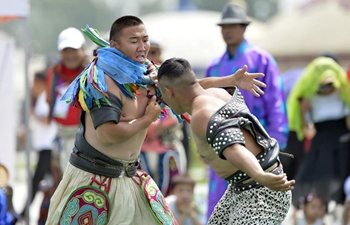
A man displays a horn-handle knife with a history of over 100 years at a store in Sanaa, capital of Yemen, June 26, 2019. The Yemenis have not been affected by the Western stylish changes as they still proudly keep their ancestors' traditional dress, especially the wear of the horn-handle knife for nearly 3,000 years. (Xinhua/Mohamed al-Azaki)
by Mohamed al-Azaki
SANAA, June 26 (Xinhua) -- Calls of prayers from old mosques echo through the mud-brick houses in the ancient Old City of Sanaa, a motion that has been repeatedly continuing daily for hundreds of years.
The Yemenis have not been affected by the Western stylish changes as they still proudly keep their ancestors' traditional dress, especially the wear of the horn-handle knife for nearly 3,000 years.
They wear it in public and social life including religious festivals and wedding ceremonies.
Known locally as Jambiya, a T-shaped handle made from rhinoceros horns or other animals' bones and decorated with gold and other precious metals, the handle is fixed into a short and curved double-edged knife.
The Jambiya is tucked inside a sheath called Aseeb, which is made of wood and covered with brown or white leather or covered with green strings.
The sheath is fastened to an ornately embroidered belt. People wear it by strapping the belt around their waists with the Jambiya in front of their robes.
Traders and residents said that the best "handle of Jambiya" worth 1 million U.S. dollars.
According to the locals, the best kinds of Jambiya's handles are sold in few shops here in the centuries-old souk.
Abdullah al Azeri, the Jambiya seller, said that his family has been in the business for more than 1,100 years.
"Contrary to what many foreign people think, Jambiya is a symbol of peace," al Azeri said.
"It is used for solving the conflicts of Yemeni tribes through submitting their own Jambiya knives to chieftains for arbitration ... at this point, the fight stops and the process of solution begins," he added.
"Jambiya is a symbol of manhood, chivalry and the identity of the Yemeni man," al Azeri said as he was sitting in his shop in the old bazaar in the center of the ancient city.
"The best Jambiya's handle is made of the horn of the rhino," he said, adding that the trade of the horns of endangered rhinos was banned many years ago.
The shops display Jambiya blades on shelves and glass windows as customers, mostly the youths, are looking for the fine Jambiya dagger.
The blacksmiths used traditional and basic tools to craft new Jambiya knives. Women craft the sheaths and decorate the belt in their homes and sell them to Jambiya sellers.
Jamal al-Kumaim, professor of political sciences at Sanaa University, said that "Jambia is a symbol of peace of Yemeni tribes."
"I wish that the Jambiya can solve the conflict between the Yemeni rival politicians," he added, referring to the four-year war between the Yemeni government and Houthis.
"Strapping Jambiya and be proud that you are one of Yemen's men," as Yemeni old song goes.















